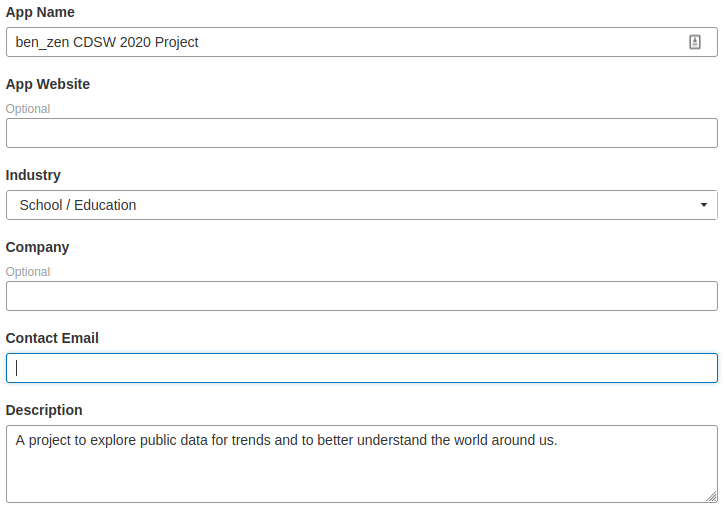Yelp API Key: Difference between revisions
(select Student -> select School/Education) |
(added another image and numbering for instructions) |
||
| Line 3: | Line 3: | ||
Web services that offer APIs (such as Yelp) want to know who's using their services; the way they do this is by requiring each developer (that's you!) building an app, or in this case your project, to have a key that your code will use every time it asks Yelp for information. | Web services that offer APIs (such as Yelp) want to know who's using their services; the way they do this is by requiring each developer (that's you!) building an app, or in this case your project, to have a key that your code will use every time it asks Yelp for information. | ||
[[File:Yelp app details.png|frame|right|400px|Step 2: An example app description and name.]] | |||
'''1.''' To begin, go to [https://www.yelp.com/developers/documentation/v3 the Yelp developer documentation page] and click on "Create app" on the left. You'll be asked to sign in; if you already have a Yelp account, you can use that; if you want to create a new account or use one of the service integrations, use those. If you sign up with an email, you ''must'' validate the email before you continue. | |||
'''2.''' After signing in, you'll see a page with fields for a name, description, and such. You'll want to give this a unique name - Your name, plus "CDSW 2020" is probably a good choice. For Industry, select School/Education. If you signed up with an email address, you can use the same email address in the contact address field, and your description can just be a comment about how it's a data science project for a course. | |||
You will want to look through the API terms of use; our specific case is allowed for under the non-commercial data analysis clause. If you're interested in using Yelp's data for commercial purposes, they have a separate license for that! Otherwise, since we won't be displaying results to end users and we'll really only be handling this data as aggregates, we're completely within their terms. | '''3.''' You will want to look through the API terms of use; our specific case is allowed for under the non-commercial data analysis clause. If you're interested in using Yelp's data for commercial purposes, they have a separate license for that! Otherwise, since we won't be displaying results to end users and we'll really only be handling this data as aggregates, we're completely within their terms. | ||
You can choose whether or not you want to receive emails; if you want to use Yelp's developer tools a lot in the future, this may be useful. | You can choose whether or not you want to receive emails; if you want to use Yelp's developer tools a lot in the future, this may be useful. | ||
After creating your key, you'll want to copy down the Client ID and Key values, and save them somewhere close to your project. These values are all Yelp knows to relate your work to you. | '''4.'''After creating your key, you'll want to copy down the Client ID and Key values, and save them somewhere close to your project. These values are all Yelp knows to relate your work to you. | ||
Revision as of 06:34, 27 January 2020
Do this if you want to take part in the Yelp afternoon session!
Web services that offer APIs (such as Yelp) want to know who's using their services; the way they do this is by requiring each developer (that's you!) building an app, or in this case your project, to have a key that your code will use every time it asks Yelp for information.
1. To begin, go to the Yelp developer documentation page and click on "Create app" on the left. You'll be asked to sign in; if you already have a Yelp account, you can use that; if you want to create a new account or use one of the service integrations, use those. If you sign up with an email, you must validate the email before you continue.
2. After signing in, you'll see a page with fields for a name, description, and such. You'll want to give this a unique name - Your name, plus "CDSW 2020" is probably a good choice. For Industry, select School/Education. If you signed up with an email address, you can use the same email address in the contact address field, and your description can just be a comment about how it's a data science project for a course.
3. You will want to look through the API terms of use; our specific case is allowed for under the non-commercial data analysis clause. If you're interested in using Yelp's data for commercial purposes, they have a separate license for that! Otherwise, since we won't be displaying results to end users and we'll really only be handling this data as aggregates, we're completely within their terms.
You can choose whether or not you want to receive emails; if you want to use Yelp's developer tools a lot in the future, this may be useful.
4.After creating your key, you'll want to copy down the Client ID and Key values, and save them somewhere close to your project. These values are all Yelp knows to relate your work to you.

